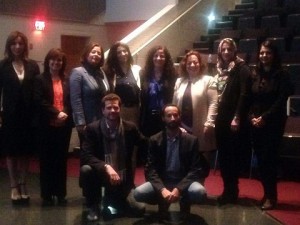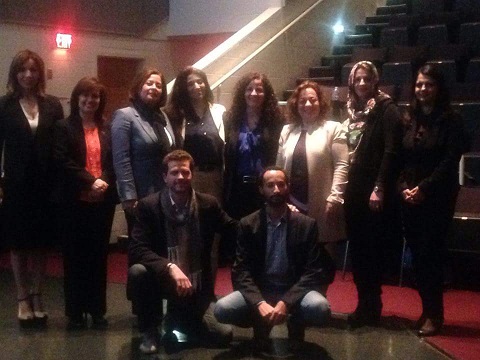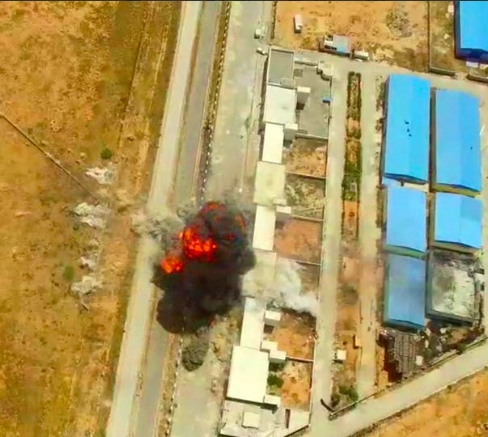By Sami Zaptia.

London, 15 April 2016:
Six leading Libyan women dominated a symposium entitled “Libya, Five Years After the 2011 Revolution,” held . . .[restrict]on 13th April at Virginia Commonwealth University, USA.
Organizers said that the symposium sough to ‘‘assess the challenges facing Libya, exploring topics including human rights, education, health, state-society relations and local governance, all with an eye toward finding the way forward for the country.’’
They noted that ‘‘five years after the revolution in Libya that toppled the dictatorship of Qaddafi, the promises of freedom, democracy and prosperity for which Libyans united and fought have yet to materialize, and the country has descended into failed statehood marked by chaos and the increasing presence of terrorist groups’’.
The event featured a number of prominent Libyan scholars, activists and dignitaries, including Wafa Bughaighis, the charge d’affaires of the Embassy of Libya in Washington, D.C.
Leading Libyan lawyer, human rights activist and expert Azza Maghur gave a paper entitled ‘’The Libyan Political Agreement: Where Does It Stand Today?’’.
Maghur said that the ‘’Libyan Political Agreement was signed last December under the auspices of the UN, after a year and a half of negotiations and dialogue’’.
‘’Parties to the Agreement are multiple and diverse. However, two main parties to the political conflict can be identified in the Agreement: the Libyan House of Representative (HOR), which is internationally recognized, and the General National Congress (GNC) that should have been replaced by the former upon the expiration of its mandate, as the sole legislative authority of the state’’.
‘’Today, both the HOR and the GNC are resisting the implementation of the Agreement. Surprisingly, both assert that the Agreement does not reflect their demands, and purport that it is ineffective. They are both asking UNSMIL to amend the Agreement, mainly in relation with the newly established Presidential Council’’.
‘’In light of these premises, the presentation will seek to assess what is left of the Libyan Political Agreement today, and the prospects and chances of making it work’’.
Shahrazad Kablan is an education consultant, political activist and former TV presenter. In her paper, ‘’Challenges and Opportunities for Reforming the Libyan Education System’’ she says that, ‘’Libya has been marked by civil and political unrest in the years since the 2011 revolution ended Qaddafi’s 42-year rule’’.
‘‘Against that backdrop, it can come as no surprise that Libya’s education system is also struggling to rebuild and to meet the demand of a youthful country’’. Kablan addressed the current challenges and the opportunities available for reforming the outdated education system from primary to higher education.
Nebras Attia, a human rights activist and journalist, said in her paper, ‘’Radical Islamist Groups in Derna Five Years After the 2011 Revolution’’ that Derna was the first city in Libya in which ISIS developed a foothold’’.
‘‘What are the conditions leading to this choice and what are the historical antecedents that produced these conditions? Historically, the population of Derna had markedly close family ties and a conservative culture. However, the “white city” was also a center of culture and music.’’
‘’Four decades of systematic targeting of young men from Derna and of a violent repression of conservative Islamic practice carried out by the Qaddafi regime, pushed some conservatives to become extremists and cemented deep familial solidarity with anti-regime Islamic fighters’’.
‘’Once Qaddafi was gone, this opened the way to strengthening ties with various violent jihadi groups (e.g. LIFG; Al Qaeda; Ansar al Sharia; Abu Slim). In light of these premises, this I will shed light on the variety of radical Islamist groups in Derna; their respective strength; their sources of funding; their relation with the youth; how they managed to unite their forces and why they divided again’’.
‘’In conclusion, the presentation will assess the condition of Derna after five years under the control of radical Islamist groups and will clarify the relations that exist between Derna and Sirt’’.
Hanan Dakhil is a Libyan-American freelance writer and activist. Her paper was entitled ‘’The Status of Libyan Women Five Years after the 2011 Revolution: Challenges and Prospects’’.
‘’Among the surprises of the 2011 Libyan revolution was the pivotal role Libyan women played in its success. In fact, women’s groups were among the most dynamic and active members in the rich and diverse civil society that sprang up following the fall of the Qaddafi regime’’.
‘’Sadly, this was to be short-lived amid the breakdown of Libya’s political transition, the deterioration of security and the rise of religious extremism. Over the last few years Libyan women have experienced increasing discrimination and marginalization in the public space, harassment and unprecedented levels of violence including murder’’.
Her presentation highlighted the conditions and obstacles currently facing women in Libya as they continue to struggle for security, social justice and equality in an increasingly challenging environment.
Najla El Mangoush is an activist, lawyer and professor of law. ‘’The Role of Religious and Traditional Leaders in Track I and II Diplomacy: Challenges and Opportunities’’ was the title of her presentation.
‘’In the context of fragile states and the security crisis, Libya becomes a perfect environment of extremism. The role of religion in current conflicts is much deeper than we think. The ignorance about religion in general divided people into secular and religious groups without thinking of the actual meaning of the definition, which increases the space between both of them with their different worldviews’’.
‘’On the other hand, State-based mediation and international negotiations are facing challenges. The UN and many international agencies seek positive contributions to peace. However, in order for this goal to be achieved the mediators need to expand their toolbox to engage at the grassroots level with moderate religious leaders’’.
There were three other presenters at the Symposium.
Mohamed Elmagbri, a youth civil society activist gave a paper on ‘’Assessment and Perspectives of Municipal Council Administrations’’ He said that ‘’In 2012, a new local governance law was passed in Libya as a response to the increasing popular demand for a better service provision and for decentralized public administration’’.
‘’My presentation assesses the current status of Municipal Councils in Libya from a few key perspectives, such as the quality of the local governance law, the operational effectiveness of some Municipal Councils, the relationship with security actors, and the process of budgeting’’.
‘’In light of these challenges, the presentation proposes an inclusive local governance approach based on the cooperation between Municipal Councils and some key local society actors’’.
Jean-Louis Romanet Perroux, a doctoral researcher on Libya gave a paper entitled ‘’State-Society Relations in Post-Qaddafi Libya’’.
‘’The presentation highlighted a few key social, cultural and political aspects that characterize the relations between Libyans and their state institutions. The aspects covered ranged from the dramatic weakness of the state; the militarization and fragmentation of society; the botched democratic transition and the current disaffection of Libyans to politics and to democratic procedures. The aim of this analysis will be to draw some important implications for the stabilization and the recovery a democratic political transition in Libya’’.
Dr. A. Omar Abubaker a leading medical and health expert gave a paper entitled ‘’The Health Care System in Libya’’. In it he briefly reviewed the current status of the health care system and provided a perspective on the future of this system. The presentation also addressed challenges and opportunities for changes in health care in Libya over the near future’’. [/restrict]









